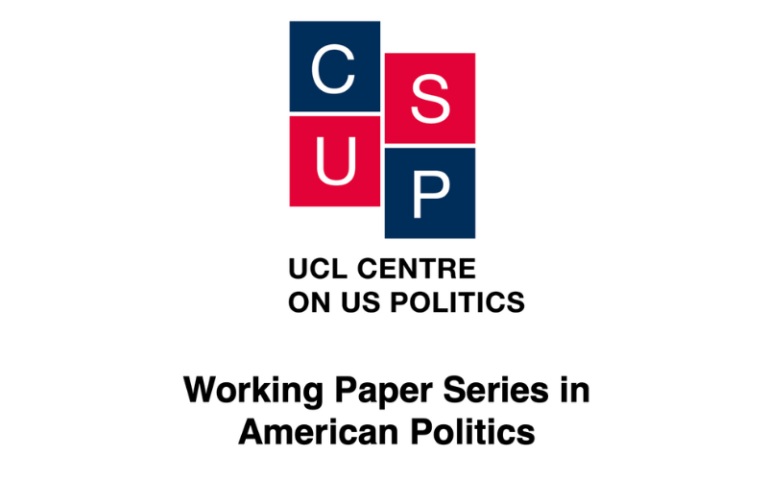Working Paper Series in American Politics 2023
11 May 2023
The Centre on US Politics has released 2023's working papers. Showcasing leading scholarship by up-and-coming academics (primarily graduate students and post-docs) working in all fields related to US politics and policy.

Housed within the Department of Political Science at UCL, one of the world’s leading universities—and with support from the UCL Institute of the Americas—CUSP is uniquely situated to provide rigorous, thoughtful, and incisive analysis of crucial political developments in the United States and their implications for a global audience.
We are delighted to announce the 2023 Working Papers, which you can find below.
Working Papers 2023
Cole, Geneva. 2023. ”White Identity and Support for Racially Inclusive Political Projects.” CUSP Working Paper No. 2023-1. London: University College London.
Download the paper: ![]() Geneva Cole_Working Paper Series in American Politics 2023.pdf
Geneva Cole_Working Paper Series in American Politics 2023.pdf
Abstract
What explains white support for racially inclusive political projects, such as welfare, affirmative action, police reform, and movements like Black Lives Matter? I argue that white identity is an important determinant of support in both opinion and behavior. Specifically, I advance a theory of white identity that varies along two key dimensions. The first, consciousness, reflects the cognitive centrality of racial group membership for individuals. The second, valence, indicates how an individual interprets this group membership in the broader social, political, and economic context, and ranges from disadvantage to advantage. Valence, a previously overlooked component of white identity, is an especially powerful predictor of white support for advancing racial inclusion—those with an advantaged valence are more supportive of these political projects while those with a disadvantaged valence remain opposed. To do this, I draw upon a national survey of white Americans from 2022 and an interview evidence from the Minneapolis-St. Paul metropolitan area in Minnesota both before and after the 2020 uprising. I find that valence is indeed a powerful determinant of white support for the Black Lives Matter movement, and to a lesser extent police reform and financial reparations for Black Americans.

genevacole@uchicago.edu
English, Jasmine. 2023. “Dilemmas of Accommodation: How Racial Diversity Can Undermine Inclusive Deliberation and Political Action in Associations.” CUSP Working Paper No. 2023-2. London: University College London.
Download the paper: ![]() Jasmine English_Working Paper Series in American Politics 2023.pdf
Jasmine English_Working Paper Series in American Politics 2023.pdf
Abstract
This article proposes that racially diverse associations are caught in a predicament. A key democratic contribution of these associations depends on their ability to facilitate discussions that teach us how racial issues affect others, and that encourage problem-solving across racial difference. In the presence of deep racial division, however, these activities are potentially fatal for associational harmony. I refer to these choices between harmony and racial tension as dilemmas of accommodation, and I argue that associations often deal with these dilemmas by developing understandings of “how we do things here” (“styles”) that involve the avoidance of race. These styles undermine the deliberative and political value of diversity because they provide paths out of deliberation and political action on racial issues. I develop these arguments inductively with case studies of two diverse churches in Boston. These cases draw on thirteen months of ethnographic and interview-based fieldwork in America’s most prevalent association.

jenglish@mit.edu
Ferrer, Joshua. 2023. ”Do Local Elections Improve Government Performance? Evidence from Election Administration.” CUSP Working Paper No. 2023-3. London: University College London.
Download the paper: ![]() Joshua Ferrer_Working Paper Series in American Politics 2023.pdf
Joshua Ferrer_Working Paper Series in American Politics 2023.pdf
Abstract
The US stands out from peer countries in the number of local officials we elect. This is especially pronounced in the area of election administration, with most jurisdictions electing officials to run their elections. Using a newly collected dataset of election administration structures in 449 counties across three states over 60 years, along with a di↵erence-in-di↵erences design, I find that appointed officials out-perform their elected counterparts, increasing voter turnout by nearly two percentage points and raising registration rates by over one percentage point. I present evidence that appointed officials do not receive noticeably more resources than elected officials and do not have more relevant experience. Instead, appointed officials may be monitored and sanctioned better than elected officials. My findings highlight the limits of local elections in securing better government performance and inform ongoing debates over local election administration in the US.

joshuaferrer@ucla.edu
Platzman, Paul. 2023. ”Social Network Heterogeneity and Partisan Affect, Partisan Stereotyping, and Policy Preference Constraint.” CUSP Working Paper No. 2023-4. London: University College London.
Download the paper: ![]() Paul Platzman_Working Paper Series in American Politics 2023.pdf
Paul Platzman_Working Paper Series in American Politics 2023.pdf
Abstract
Research over the past two decades has revealed a number of relationships between voters’ political attitudes and the heterogeneity of their political discussion networks. In this paper, I test Lupton and Thornton’s (2017) contention that social network heterogeneity is, in actuality, a combination of two independent network attributes: disagreement and diversity. Using three surveys administered between 2008 and 2020, I shed new light on the relationship between disagreement and diversity vis-à-vis their relationship to each other and to important political attitudes. Using both cross-sectional and panel data, I demonstrate that exposure to disagreement is associated with reduced partisan affective intensity, partisan stereotyping, and policy preference constraint. I distinguish this from the predominantly null relationships these attitudes possess to exposure to diversity. In addition, I demonstrate the moderating role that a voter’s interest in politics plays on the influence of disagreement but not diversity. I conclude by reassessing the normative desirability of promoting social network disagreement if its cost is disengagement from political affairs and reduced policy preference consistency.

paul.platzman@columbia.edu
 Close
Close

